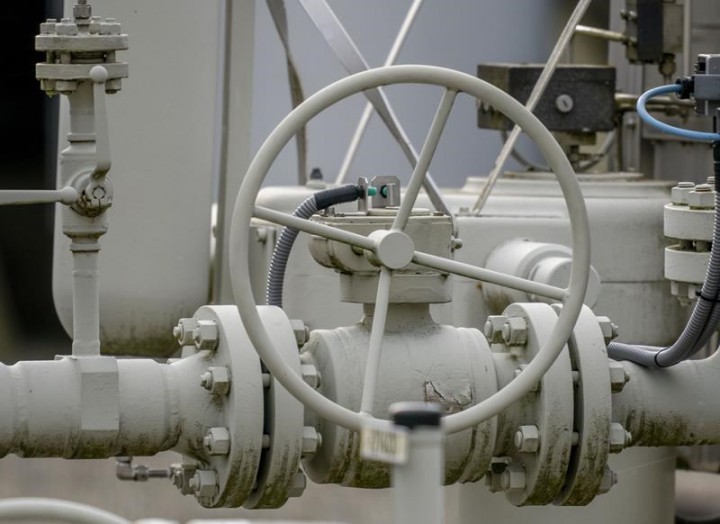OTTAWA — Protesters called on Canada to “be brave like Ukraine” and uphold economic sanctions against Russia on Sunday, just hours after Ukrainian President Volodymyr Zelenskyy delivered essentially the same message to the Prime Minister.
In a phone call between the leaders, Zelenskyy told Justin Trudeau that his stance on sanctions against Russia “must be principled” at a time when relations between Canada and the embattled country are somewhat strained by Canada’s controversial decision to send parts of a Russian natural gas pipeline back to Germany.
Zelenskyy recapped their conversation in a short statement shared on Twitter, saying he thanked Trudeau for the continued powerful defence support Canada has offered his country but also raised the importance of upholding the sanctions.
“After the terrorist attacks in Vinnytsia, Mykolaiv, Chasiv Yar, etc. the pressure must be increased, not decreased,” he said.
Trudeau reiterated Canada’s support for Ukraine against Russia’s military aggression, according to an official account of the discussion from the Prime Minister’s Office.
The two leaders also talked about maintaining unity among their allies and imposing “severe costs” on Russia, the PMO said.
Canada agreed earlier this month to grant an exemption to the economic sanctions issued against Russia in response to the invasion of Ukraine.
The two-year waiver would allow six Siemens Energy turbines, which were in Montreal for repairs, to be returned to Germany for use in the Russian state-owned Nord Stream 1 pipeline.
Trudeau has previously defended the decision and said Canada’s German ally relies on the natural gas supply from the pipeline.
In a written and video address last week, however, Zelenskyy called the move “absolutely unacceptable.”
Russian state-owned energy company Gazprom reduced gas deliveries from its Nord Stream 1 pipeline, which runs to northeastern Germany, by 60 per cent last month, citing turbine-related technical problems.
The decision has left several Ukrainian supporters who attended a rally in Ottawa Sunday afternoon in a state of disbelief.
Canadian-Ukrainian Yuri Kolomiyets told the crowd of about 150 supporters assembled on the lawn of Parliament Hill that the decision will mean more oil and gas money for Russia to fund its attack on Ukraine.
“I guess it’s okay to supply genocidal maniacs with the technology and the money, as long as it keeps German voters happy,” Kolomiyets told the crowd, eliciting cries of “shame” in response.
“It’s not their children who are dying in the missile strikes.”
Two young protesters, Arsenii Pivtorak and Ladislao Zaichka, have been camped outside of Parliament Hill for days and say they’ve been on a hunger strike since July 9 when the waiver was announced.
“This decision broke our heart. We felt like the German’s pockets were more important than Ukrainian lives,” Pivtorak, 19, said of the decision.
Zaichka said he’s particularly passionate about the decision because he has family in Ukraine.
“What Justin Trudeau did and what the Canadian government has done is upsetting for me as a Canadian but even worse for me as a Ukrainian,” he said.
The Ottawa chapter of the Ukrainian Canadian Congress planned the Parliament Hill protest to urge the government to revoke the waiver.
The protesters called for Deputy Prime Minister Chrystia Freeland, who defended the turbine decision last week, to answer to the Ukrainian community in Canada. They also chanted for the government to “stand with Ukraine.”
Speaking to reporters in a teleconference after a meeting of G20 finance ministers in Bali, Indonesia on Saturday, Freeland said Germany’s ability to sustain its support for Ukraine could be at risk if the turbines were not returned. She said a united G7 effort would be needed to support Ukraine and allowing the repaired parts to return to Germany was “the right thing to do.” The United States has also spoken up in support of Canada’s decision.
The congress’ parent organization, the Ukrainian World Congress, has petitioned the Federal Court for a judicial review in hopes of stopping the turbines from making it to Germany.
“Both Canada and Germany, we feel, have been manipulated here by the Russians,” said Ukrainian Congress national executive director Ihor Michalchyshyn ahead of the planned protest.
The group contends Canada bowed to Russian blackmail and set a dangerous precedent that will lead to the weakening of the sanctions regime imposed on Russia.
“This is a decision that has angered Canadians and the Ukrainian government as well,” Michalchyshyn said.
He said Ukrainian-Canadians involved in his group initially expressed surprise and disappointment when they learned that Canada would allow the turbines to be returned.
The government has also faced political backlash. In a video posted on Twitter Sunday, Alberta Premier Jason Kenney admonished the Liberals for helping to fund Russian oil and gas and allowing the country to continue to dominate the European energy market.
“Why do we have a government in Ottawa that is impeding efforts to export responsible Canadian energy to Europe while helping Vladimir Putin’s Gazprom to continue to dominate European energy markets? It makes no sense,” Kenney said.
The Ukrainian Canadian Congress is expected to appear at a Foreign Affairs Committee meeting to discuss the decision, along with the ambassadors of Ukraine, Germany and the European Union to Canada.
Foreign Affairs Minister Mélanie Joly and Natural Resources Minister Jonathan Wilkinson have also been summoned to the committee to answer questions about the exception.
Echoing Zelenskyy’s principled stand on sanctions, protester Oksana Bashuk Hepburn said Canada’s strength is its values. Standing in front of the parliament buildings in a straw hat decorated with a ribbon in Ukraine’s yellow and blue colours, she said Canada should stick to those values and stand by the sanctions.
“You have suasion because you have an honorable reputation. Take it back,” she said.
This report by The Canadian Press was first published July 17, 2022.
Laura Osman, The Canadian Press
Related


































